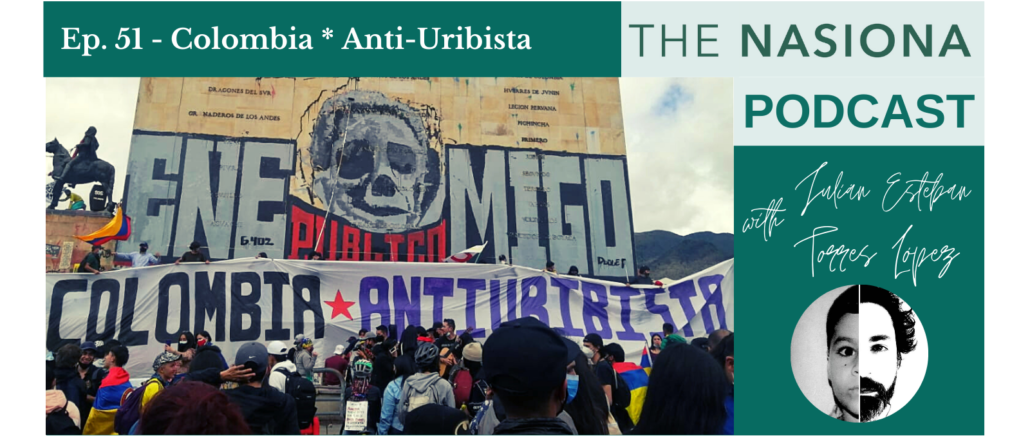
You can also find our podcast episodes on Apple Podcasts, Spotify, iHeartRadio, Stitcher, or wherever you get your podcasts.
Last week, I published an episode entitled “Colombia’s Historical Lack of Hegemony and Institutionalized Violence,” where I provided a thorough historical recap so you can better grasp the current Great Colombian Uprising and the predictable violent government response to it. (Listen to the episode here.) Though I covered two centuries of history, I stopped in the early 1990s because I lost my voice. Today, I want to fill some important gaps.
Go on social media and type the hashtag #AntiUribista and you will find photos of cities in Colombia (and around the world) declaring themselves Anti-Uribistas as they resist and protest current state violence. Today, I cover the eight years Álvaro Uribe was president of Colombia, from 2002 to 2010, and why he is such a polarizing figure: praised by imperialist and colonial powers and multinational corporations, and scorned by anyone with a heart.
I provide a thorough overview into the many reasons behind the current Anti-Uribismo movement, and also give you a glimpse into the United States’s love affair with Uribe, along with its role and responsibility in Colombia’s militarized state since the turn of the century.
Like last week, I read excerpts from my book, Reporting on Colombia: Essays on Colombia’s History, Culture, Peoples, and Armed Conflict.
Today, Colombia and the Colombian people are in crisis. The Colombian government is killing, torturing, disappearing, and sexually assaulting Colombian people on the streets throughout the country. Our hearts are heavy and in pain. We need your help. Please don’t look away.
To help Colombia and Colombians:
Julián Esteban Torres López (he/him/his/él) is a bilingual, Colombia-born culture architect with Afro-Euro-Indigenous roots. For two decades, Julián has studied systems of oppression and has worked toward humanizing those who have been socially, politically, and geographically excluded from the hierarchies of power by centering, elevating, and amplifying their voices, experiences, and histories. He is the founder of the social justice storytelling movement The Nasiona, where he also hosts and produces The Nasiona Podcast. He’s a Pushcart Prize and Best Small Fictions nominee, a Trilogy Award in Short Fiction finalist, and the author of Marx’s Humanism and Its Limits and Reporting On Colombia. His poetry collection, Ninety-Two Surgically Enhanced Mannequins, is available now. His work appears in PANK Magazine, Into the Void Magazine, The Acentos Review, Novus Literary Arts Journal, Havic 2021: Inside Brilliance, among others. Julián holds a bachelor’s in philosophy and in communication and a master’s in justice studies from the University of New Hampshire and was a Ph.D. candidate at the University of British Columbia Okanagan, where he focused on political science and Latin American studies.



